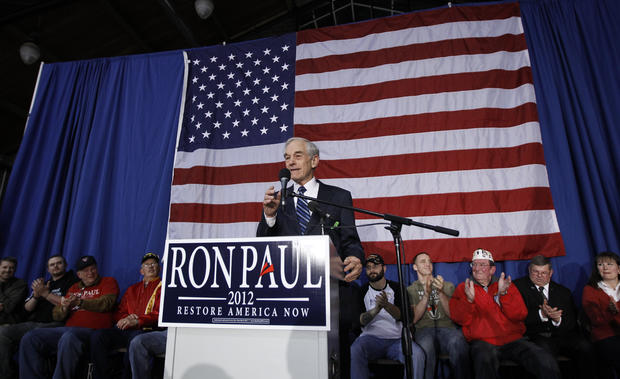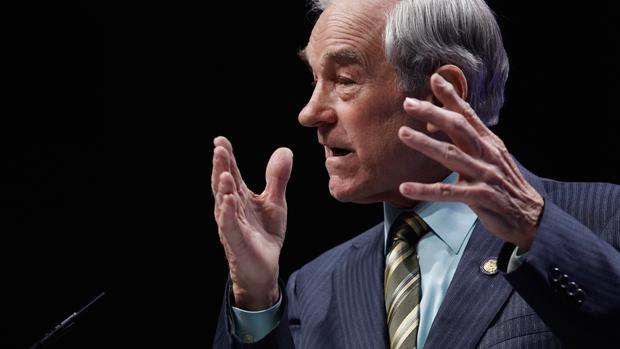What happens if Ron Paul wins Iowa?
PERRY, IOWA - Don't be fooled by the fact that Iowa is landlocked: Ron Paul and his supporters in the Hawkeye State are on their own little island.
You see it in the unblinking allegiance of Paul supporters like Kent Voth, who said before a Paul rally here Thursday that he wouldn't support the Republican presidential nominee if it isn't Ron Paul.
"He's the only politician I've heard in my adult life that I agree with 100 percent of his message," said Voth.
You see it in the foreign policy rhetoric offered by the Texas lawmaker, who has come under heavy fire from his rivals over his isolationist views--which they call dangerous. To Paul, the sanctions against Iran are "acts of war." Iranian threats to close the Strait of Hormuz are the result of U.S. aggression -- an effort, he said, to get America to "back off."
Full CBSNews.com coverage: Election 2012And you see it the outlook of Paul's young supporters, many of whom had come to hear Paul speak with a parent in tow. Among them was Jordan Sorensen from Adel, Iowa, who called himself "libertarian-leaning" and said he doesn't really feel at home in the modern Republican party.
"I think that the neoconservatives have really taken over the Republican Party and really pushed social issues and pushed these very hardline military, foreign policy views that I strongly disagree with," he said.
With less than a week left until the January 3 caucuses, polls of likely caucus-goers show Paul in a statistical dead heat with Mitt Romney atop the field. Paul has the best get-out-the-vote organization of any candidate in the state -- a result of his 2008 bid and the "campaign for liberty" that grew in its wake -- a major advantage in the caucuses, which require voters to attend what is essentially a community meeting on a cold January evening.
And while Paul's campaign dismisses the conventional wisdom that the 76-year-old Texan can't win the nomination, the candidate himself seems somewhat taken aback by his rise in the polls - and the media scrutiny that followed. On Wednesday, he twice mentioned how many cameras there were at his events, and reporters are swarming him as he concludes his speeches, elbowing each other and shouting (mostly ignored) questions as the candidate leaves the podium.
Michele Bachmann, Rick Santorum, Newt Gingrich and Rick Perry surely did not envision trailing Paul on the verge of the caucuses, and their criticisms of him have been particularly vicious. (Gingrich said Paul's views are "totally outside the mainstream of virtually every decent American" and that he wouldn't vote for Paul in the general election; Bachmann said Paul "will not defend United States of America in the event of a nuclear attack"; Santorum has taken to referencing Paul's advanced age, erroneously suggesting Paul is actually 78 years old, not 76.) A unifying theme of their criticism is that Paul will not keep Americans safe: To quote Perry: "You don't have to vote for a candidate who will allow Iran to have a nuclear weapon to wipe Israel off the face of the earth because America will be next."
Paul, who is known for his ideological consistency, is trying to deflect the criticism by drawing a distinction between military spending -- which he wants to cut significantly as part of his proposal to cut $1 trillion in his first year in office -- and defense spending, which he says he supports. Paul, who wants to end the war in Afghanistan and remove troops from Germany, Japan and South Korea, says America can "cut significantly overseas and never have to cut defense."
The one Republican who has gone easy on Paul so far has been Romney, in large part because Romney doesn't seem to see Paul as a threat. (One senior Paul staffer told CBS News Political Hotsheet that the Paul and Romney campaigns don't feel like they're fighting for the same pool of voters.) But that will change if Paul wins Iowa and no other candidate emerges as a strong alternative to Romney - setting up the prospect of an unlikely two man race between the Texas Libertarian and the former governor the Gingrich campaign derisively calls a "Massachusetts moderate."
Should such a situation develop, Romney would be the heavy favorite. Paul seems to have a natural ceiling among GOP voters: A recent Washington Post/ABC News poll found that nearly half of Republican voters feel Paul's foreign policy views are a major reason not to vote for him. Indeed, the primary reason Paul has an opening to win in Iowa is that no consensus candidate has emerged among social conservatives, which dominate the GOP electorate here -- a situation that allows Paul to potentially win with less than 30 percent of the vote.
Still, a Paul win in Iowa would have significant ramifications. It would go a long way toward pushing his Libertarian views, long dismissed as outside of Republican mainstream, to the center of the conversation. The resultant media coverage would allow Paul to further spread his message -- and potentially win a host of new supporters. And if Paul can do well in New Hampshire on January 10, where he is currently tied for second place with Gingrich, Paul could even move to shared front-runner status with Romney, who is now ahead by more than 20 points in New Hampshire)
(That would also mean an increased focus on those aspects of Paul that raise serious questions, including a series of racist newsletters that went out under his name.)
It is not clear what will happen if Paul gains significant traction but doesn't become the GOP presidential nominee. Paul says he has no plans to run as a third party candidate, but if he doesn't win the nomination he will face enormous pressure to do so from supporters like Nick Hofstetter, who says flatly, "I don't think I'd support any of the other Republican candidates, because they're dangerous in my opinion."
Paul, who ran for president on the Libertarian line, could also potentially endorse the Libertarian presidential nominee, though his campaign has signaled such an endorsement is unlikely. Either move could potentially splinter the Republican vote and prompt criticisms of Paul as a spoiler akin to Ralph Nader, whose 2000 presidential run helped lead to George W. Bush's victory over Al Gore.
Before Paul's rally here Thursday, Paul supporter Kim Greenlee of Panora, Iowa said she would have to "regroup" if Paul isn't the nominee -- "because he is really the only one who I have an interest in, and it's because he's so different."
Echoing that comment was Terry McCrary of Marshalltown, who said that if Paul isn't the nominee, "I don't know who I would support." After saying he wouldn't back President Obama or the Libertarian candidate, he was asked if he would simply sit the election out if Paul weren't on the ballot.
"I just don't know," he said. "I'll probably vote for some Republican -- but right now I have no second choice."

